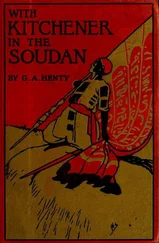George Henty - With Kitchener in the Soudan - A Story of Atbara and Omdurman
Здесь есть возможность читать онлайн «George Henty - With Kitchener in the Soudan - A Story of Atbara and Omdurman» — ознакомительный отрывок электронной книги совершенно бесплатно, а после прочтения отрывка купить полную версию. В некоторых случаях можно слушать аудио, скачать через торрент в формате fb2 и присутствует краткое содержание. Жанр: Прочие приключения, Прочие приключения, foreign_antique, foreign_prose, foreign_children, на английском языке. Описание произведения, (предисловие) а так же отзывы посетителей доступны на портале библиотеки ЛибКат.
- Название:With Kitchener in the Soudan: A Story of Atbara and Omdurman
- Автор:
- Жанр:
- Год:неизвестен
- ISBN:нет данных
- Рейтинг книги:5 / 5. Голосов: 1
-
Избранное:Добавить в избранное
- Отзывы:
-
Ваша оценка:
- 100
- 1
- 2
- 3
- 4
- 5
With Kitchener in the Soudan: A Story of Atbara and Omdurman: краткое содержание, описание и аннотация
Предлагаем к чтению аннотацию, описание, краткое содержание или предисловие (зависит от того, что написал сам автор книги «With Kitchener in the Soudan: A Story of Atbara and Omdurman»). Если вы не нашли необходимую информацию о книге — напишите в комментариях, мы постараемся отыскать её.
With Kitchener in the Soudan: A Story of Atbara and Omdurman — читать онлайн ознакомительный отрывок
Ниже представлен текст книги, разбитый по страницам. Система сохранения места последней прочитанной страницы, позволяет с удобством читать онлайн бесплатно книгу «With Kitchener in the Soudan: A Story of Atbara and Omdurman», без необходимости каждый раз заново искать на чём Вы остановились. Поставьте закладку, и сможете в любой момент перейти на страницу, на которой закончили чтение.
Интервал:
Закладка:
Gregory's plan, for keeping out the dust from the food, turned out a great success; and the meals were eaten in the open air, during the stoppages.
On arriving at Assouan, they all went to the transport department, to get their passes for the journey up the Nile, as far as Wady Halfa. The next step was to go down to the river for a swim and, by dint of shaking and beating, to get rid of the accumulated dust.
Assouan was not a pleasant place to linger in and, as soon as they had completed their purchases, Captain Ewart and Gregory climbed on to the loaded railway train, and were carried by the short line to the spot where, above the cataract, the steamer that was to carry them was lying. She was to tow up a large barge, and two native craft. They took their places in the steamer, with a number of other officers–some newcomers from England, others men who had been down to Cairo, to recruit. They belonged to all branches of the service, and included half a dozen of the medical staff, three of the transport corps, gunners, engineers, cavalry, and infantry. The barges were deep in the water, with their cargoes of stores of all kinds, and rails and sleepers for the railway, and the steamer was also deeply loaded.
The passage was a delightful one, to Gregory. Everything was new to him. The cheery talk and jokes of the officers, the graver discussion of the work before them, the calculations as to time and distance, the stories told of what had taken place during the previous campaign, by those who shared in it, were all so different from anything he had ever before experienced, that the hours passed almost unnoticed. It was glorious to think that, in whatever humble capacity, he was yet one of the band who were on their way up to meet the hordes of the Khalifa, to rescue the Soudan from the tyranny under which it had groaned, to avenge Gordon and Hicks and the gallant men who had died with them!
Occasionally, Captain Ewart came up and talked to him, but he was well content to sit on one of the bales, and listen to the conversation without joining in it. In another couple of years he, too, would have had his experiences, and would be able to take his part. At present, he preferred to be a listener.
The distance to Wady Halfa was some three hundred miles; but the current was strong, and the steamer could not tow the boats more than five miles an hour, against it. It was sixty hours, from the start, before they arrived.
Gregory was astonished at the stir and life in the place. Great numbers of native labourers were at work, unloading barges and native craft; and a line of railway ran down to the wharves, where the work of loading the trucks went on briskly. Smoke pouring out from many chimneys, and the clang of hammers, told that the railway engineering work was in full swing. Vast piles of boxes, cases, and bales were accumulated on the wharf, and showed that there would be no loss of time in pushing forward supplies to Abu Hamed, as soon as the railway was completed to that point.
Wady Halfa had been the starting point of a railway, commenced years before. A few miles have been constructed, and several buildings erected for the functionaries, military and civil; but Gordon, when Governor of the Soudan, had refused to allow the province to be saddled with the expenses of the construction, or to undertake the responsibility of carrying it out.
In 1884 there was some renewal of work and, had Gordon been rescued, and Khartoum permanently occupied, the line would no doubt have been carried on; but with the retirement of the British troops, work ceased, and the great stores of material that had been gathered there remained, for years, half covered with the sand. In any other climate this would have been destructive, but in the dry air of Upper Egypt they remained almost uninjured, and proved very useful, when the work was again taken up.
It was a wonderful undertaking, for along the two hundred and thirty-four miles of desert, food, water, and every necessary had to be carried, together with all materials for its construction. Not only had an army of workmen to be fed, but a body of troops to guard them; for Abu Hamed, at the other end of the line, for which they were making, was occupied by a large body of Dervishes; who might, at any moment, swoop down across the plain.
Had the Sirdar had the resources of England at his back, the work would have been easier, for he could have ordered from home new engines, and plant of every description; but it was an Egyptian work, and had to be done in the cheapest possible way. Old engines had to be patched up, and makeshifts of all kinds employed. Fortunately he had, in the chief engineer of the line, a man whose energy, determination, and resource were equal to his own. Major Girouard was a young officer of the Royal Engineers and, like all white officers in the Egyptian service, held the rank of major. He was a Canadian by birth, and proved, in every respect, equal to the onerous and responsible work to which he was appointed.
However, labour was cheap, and railway battalions were raised among the Egyptian peasants, their pay being the same as that of the soldiers. Strong, hearty, and accustomed to labour and a scanty diet, no men could have been more fitted for the work. They preferred it to soldiering; for although, as they had already shown, and were still further to prove, the Egyptian can fight, and fight bravely; he is, by nature, peaceable, and prefers work, however hard. In addition to these battalions, natives of the country and of the Soudan, fugitives from ruined villages and desolated plains, were largely employed.
The line had now been carried three-quarters of the distance to Abu Hamed, which was still in the hands of the Dervishes. It had been constructed with extraordinary rapidity, for the ground was so level that only occasional cuttings were needed. The organization of labour was perfect. The men were divided into gangs, each under a head man, and each having its own special work to do. There were the men who unloaded the trucks, the labourers who did the earth work, and the more skilled hands who levelled it. As fast as the trucks were emptied, gangs of men carried the sleepers forward, and laid them down roughly in position; others followed, and corrected the distance between each. The rails were then brought along and laid down, with the fish plates, in the proper places; men put these on, and boys screwed up the nuts. Then plate layers followed and lined the rails accurately; and, when this was done, sand was thrown in and packed down between the sleepers.
By this division of labour, the line was pushed on from one to two miles a day, the camp moving forward with the line. Six tank trucks brought up the water for the use of the labourers, daily, and everything worked with as much regularity as in a great factory at home. Troops of friendly tribesmen, in our pay, scoured the country and watched the wells along the road, farther to the east, so as to prevent any bands of Dervishes from dashing suddenly down upon the workers.
At Wady Halfa, Captain Ewart and two or three other officers left the steamer, to proceed up the line. Gregory was very sorry to lose him.
"I cannot tell you, Captain Ewart," he said, "how deeply grateful I feel to you, for the immense kindness you have shown me. I don't know what I should have done, had I been left without your advice and assistance in getting my outfit, and making my arrangements to come up here."
"My dear lad," the latter said, "don't say anything more. In any case, I should naturally be glad to do what I could, for the son of a man who died fighting in the same cause as we are now engaged in. But in your case it has been a pleasure, for I am sure you will do credit to yourself, and to the mother who has taken such pains in preparing you for the work you are going to do, and in fitting you for the position that you now occupy."
Читать дальшеИнтервал:
Закладка:
Похожие книги на «With Kitchener in the Soudan: A Story of Atbara and Omdurman»
Представляем Вашему вниманию похожие книги на «With Kitchener in the Soudan: A Story of Atbara and Omdurman» списком для выбора. Мы отобрали схожую по названию и смыслу литературу в надежде предоставить читателям больше вариантов отыскать новые, интересные, ещё непрочитанные произведения.
Обсуждение, отзывы о книге «With Kitchener in the Soudan: A Story of Atbara and Omdurman» и просто собственные мнения читателей. Оставьте ваши комментарии, напишите, что Вы думаете о произведении, его смысле или главных героях. Укажите что конкретно понравилось, а что нет, и почему Вы так считаете.












